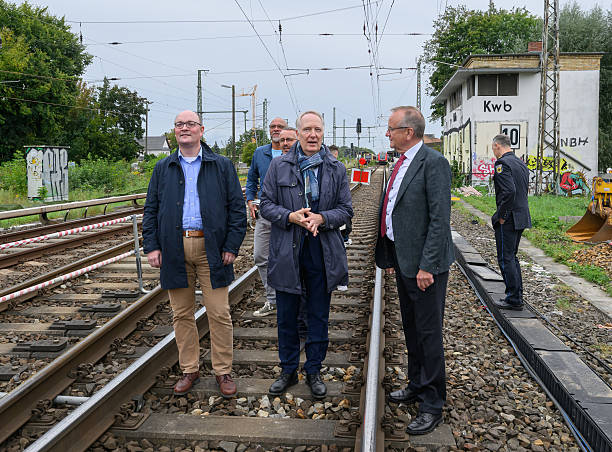Introduction
Germany’s booming infrastructure sector faces a significant shortage of skilled construction workers. To address this need, employers are actively recruiting from abroad, offering attractive salaries and visa sponsorship for qualified foreign professionals. This guide details the high-paying jobs available in 2025/2026, along with salary insights, visa processes, and how to apply.
Fill the form below
and wait
Why Germany Needs Foreign Construction Workers
-
Labour Shortage: Thousands of workers are set to retire by 2030.
-
Infrastructure Investment: Billions invested in roads, housing, green energy, and railways.
-
Skilled Immigration Act: Germany’s updated laws make it easier for foreign workers to apply.
-
Visa Sponsorship: Employers with urgent demand now actively sponsor skilled foreigners.
Also Read: Employment Opportunities in Australia for Foreigners: Updated 2025 Visa and Salary Guide
Top High-Paying Construction Jobs in Germany (2025/2026)
| Job Title | Average Annual Salary (EUR) | Why It Pays Well | Visa Sponsorship Potential |
|---|---|---|---|
| Construction Project Manager | €60,000 – €90,000 | High responsibility for budgets & planning | Very High |
| Civil / Structural Engineer | €55,000 – €85,000 | Licensed professionals in strong demand | Very High |
| Quantity Surveyor / Estimator | €50,000 – €75,000 | Controls project finances & contracts | High |
| Health & Safety Officer | €45,000 – €70,000 | Ensures compliance with EU safety laws | High |
| Skilled Trades (Carpenters, Bricklayers, Roofers, Electricians, Plumbers) | €35,000 – €55,000 | Shortage in manual trades | High |
| Heavy Equipment Operators | €40,000 – €60,000 | Specialized machinery expertise | Medium–High |
| Welders & Metal Fabricators | €38,000 – €55,000 | High demand in construction & manufacturing | High |
💡 Salaries are higher in Munich, Frankfurt, Hamburg, and Berlin, but living costs are also higher.
Visa & Immigration Pathways for Construction Jobs in Germany
1. Skilled Worker Visa (Fachkräfteeinwanderungsgesetz)
-
For tradespeople and professionals with formal training or degrees.
-
Requires recognition of qualifications by German authorities.
2. EU Blue Card
-
For highly qualified professionals (e.g., engineers, project managers).
-
Minimum salary requirement: ~€45,300/year (lower for shortage occupations).
3. Job Seeker Visa
-
Allows you to stay in Germany for 6 months while searching for work.
-
Must prove sufficient funds and qualifications.
Also read: 15 Canadian Employers Offering Visa Sponsorship to Foreign Workers in 2025
How to Apply for High-Paying Construction Jobs in Germany
-
Check Eligible Occupations
-
Confirm your job is recognized under Germany’s Skilled Immigration Act.
-
-
Prepare Documents
-
CV (Europa’s format), diploma/certifications, proof of experience.
-
German language skills (B1–B2 recommended, though some employers hire English speakers).
-
-
Search Jobs With Sponsorship
-
Job portals: Make-it-in-Germany.com, Stepstone, Indeed Germany.
-
Apply through licensed recruitment agencies.
-
-
Apply for Recognition of Qualifications
-
For trades and engineering roles, your qualifications must be certified in Germany.
-
-
Secure Sponsorship & Apply for Visa
-
Once you have an offer, employer provides documentation to apply for a Skilled Worker Visa or Blue Card.
-
Benefits of Working in Germany’s Construction Industry
-
High salaries compared to other EU countries.
-
Pathway to Permanent Residency after a few years of working.
-
Family reunification visas available.
-
Healthcare & social benefits included.
-
Long-term career growth in one of Europe’s strongest economies.
FAQs
1. Do I need to speak German for construction jobs in Germany?
👉 For trades and site roles, basic German is highly recommended. For engineers and managers, some international firms may hire English speakers.
2. Can unskilled workers apply?
👉 No, only skilled roles with recognized qualifications are eligible for sponsorship.
3. How much can a foreign construction worker earn in Germany?
👉 Salaries range from €35,000 to €90,000/year, depending on the role and experience.
Conclusion
Germany’s construction boom is creating a wealth of high-paying, visa-sponsored opportunities for foreign workers in 2025 and 2026. Whether you’re a project manager, engineer, or skilled tradesperson, your expertise is in high demand. Programs like the Skilled Worker Visa and EU Blue Card offer a direct route to not just a job, but a long-term career and permanent residency in Germany.
Your journey starts now: Prepare your documents, begin learning basic German, and start targeting employers who offer sponsorship.
